WHO supports life-saving and essential health care services in Daraa, south Syria
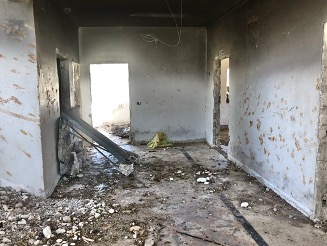 WHO is in the process of rehabilitating Daraa tuberculosis centre, planned for completion by the end of 202112 August 2021, Damascus, Syria – In response to ongoing conflict in Daraa, south Syria, WHO is working with the Ministry of Health and local health partners to respond to urgent health needs.
WHO is in the process of rehabilitating Daraa tuberculosis centre, planned for completion by the end of 202112 August 2021, Damascus, Syria – In response to ongoing conflict in Daraa, south Syria, WHO is working with the Ministry of Health and local health partners to respond to urgent health needs.
“Escalating conflict in Daraa has resulted in significant population movement and increased health needs among an already vulnerable population. WHO has delivered essential supplies and is working with partners to make sure that urgently needed health services are being provided to all those who need them,” said Dr Akjemal Magtymova, WHO Representative and Head of Mission in Syria.
On 2 August, WHO delivered more than 7.6 tons of essential medicines and supplies to Daraa National Hospital and Daraa Health Authority. The shipment includes surgical and trauma kits and medical supplies, intravenous fluids and anesthetics, which are enough to provide almost 88 000 treatment courses, as well as support 830 trauma cases.
Together with Al-Nour Foundation, WHO is supporting a mobile clinic that provides diagnostic services, laboratory, and radiology referrals. Five WHO-supported mobile medical teams are providing health services for displaced people and communities, and WHO is planning to deploy an additional 2 mobile teams, as well as health experts to identify the health needs of people living in shelters. Six ambulances previously donated by WHO in 2020 and 2021 to Daraa Health Authority are on the ground supporting referral services.
New waves of displaced people seeking shelter in schools and mosques, coupled with a volatile security situation in areas such as Dara Al Balad are creating challenges to the health response in the area. Damage to the essential dialysis water tanks in Daraa National Hospital has led to the dialysis department being out of service.
WHO is actively working to restore non-functional and partially functional health facilities to ensure continued access to health care by people in the area. With the generous support of a number of donors, WHO is in the process of rehabilitating 2 primary health care clinics, a tuberculosis centre, and Nawa National hospital – all planned for completion by the end of 2021. When fully functional, these facilities will provide essential health care services to an estimated 1.025 million people living in the Daraa governorate.
Kuwait supports essential health care service availability in Syria with additional US$3 million
12 August 2021, Damascus, Syria – WHO welcomes a new donation from the Kuwait Fund For Arab Economic Development to support health care for all people in need in Syria. This new contribution of US$ 3 million comes at a critical time as the health system faces shortages in resources due to sanctions and is overwhelmed by the ongoing COVID-19 pandemic.
“Kuwait has been a long-standing partner to WHO in our work to save the lives of the Syrian people. We are grateful for this generous contribution that has come as a major step towards reviving the availability of health care services to all people in need, and supports WHO’s commitment to alleviate the immense suffering of the Syrian people,” said Dr Akjemal Magtymova, WHO Representative and Head of Mission in Syria.
Gaps in local production of medicines within Syria have left significant shortages in much needed essential medicines, especially for patients with chronic conditions. Noncommunicable diseases are now the highest cause of morbidity in Syria, accounting for 45% of all deaths in the country. This new funding will enable WHO to increase access of vulnerable people to life-saving treatment for noncommunicable diseases, including asthma and chronic pulmonary conditions, cancer, cardiovascular disease, diabetes and kidney failure.
With this generous support, WHO will also continue strengthening the COVID-19 response, as well as support the national immunization programme in the implementation of COVID-19 vaccination campaigns targeting high-risk groups, including internally displaced people and host communities.
Part of the funds will also be used to purchase 5 fully equipped ambulances that will boost national efforts to strengthen the management of trauma cases, increase access to health care services, and facilitate transportation and referral of emergency cases among internally displaced people and host communities to the nearest health facility. As the crisis enters its eleventh year, 6.1 million people remain internally displaced and are at increased risk of infectious diseases due to limited access to safe water and sanitation, overcrowding and other risk factors. In Syria today, there are cases of epidemic-prone diseases like acute diarrhoea, leishmaniasis, and suspected hepatitis.
As of June 2021, only 47% of public hospitals are fully functioning, resulting in access to health services to millions being crippled. Shortages of trained health workers are very visible on the ground, as a result of more than a decade of war, and a declining economic situation.
“Syria is experiencing a protracted political and socioeconomic crisis that has resulted in a severe deterioration of living conditions. The scale, severity and complexity of humanitarian needs remain extensive. The health system has taken a devastating blow as a direct result of the crisis and aggravated by the sanctions coupled with the ongoing COVID-19 pandemic. Long-standing partners to WHO, such as the Government of Kuwait, help WHO ensure that health care services to all vulnerable Syrians continue uninterrupted, and help us fulfil our common vision of universal health coverage and health care for all by all,” added Dr Magtymova.
Updates on COVID-19 vaccination in Syria, August 2021
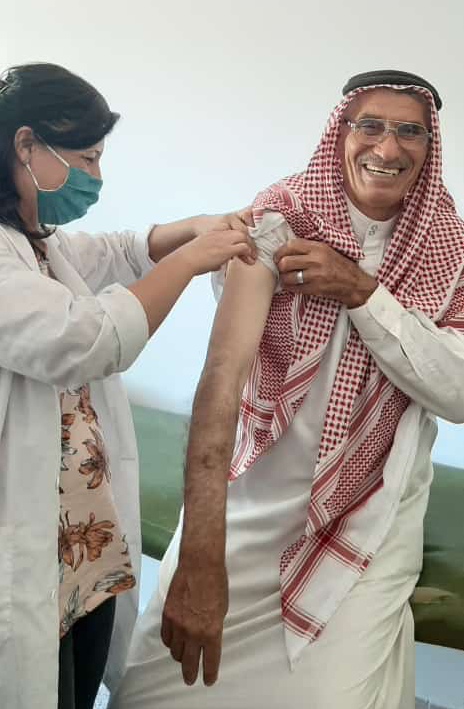 11 August 2021 – More than 355 500 total doses of COVID-19 vaccines have been administered in Syria as of 9 August as part of ongoing efforts to protect priority groups and control virus transmission. This includes 55 500 doses administered in northwest Syria and 19 354 doses administered in northeast Syria.
11 August 2021 – More than 355 500 total doses of COVID-19 vaccines have been administered in Syria as of 9 August as part of ongoing efforts to protect priority groups and control virus transmission. This includes 55 500 doses administered in northwest Syria and 19 354 doses administered in northeast Syria.
This coverage reflects less than 1% of the total population who have been vaccinated with one dose and 0.6% who are fully vaccinated, making Syria one of the countries with the lowest vaccine coverage globally.
“In line with WHO recommendations, Syria’s vaccination strategy aims to first reach people who are more at risk of serious illness if infected with COVID-19. WHO is working with national health authorities to regularly review and update Syria’s national plan to deploy vaccines and deliver them to identified target populations, taking into account anticipated limited supplies,” said Dr Akjemal Magtymova, WHO Representative and Head of Mission in Syria.
Three main groups are prioritized for vaccination: health care workers, people over 55 years of age, and people with chronic diseases. Other priority groups included internally displaced people living in camps, prisoners, and teachers. In northwest Syria, vaccination teams are initially prioritizing health care workers as per the vaccination strategy.
An additional 2.36 million doses of vaccines are expected to be delivered to Syria over several consecutive shipments in the coming months through the COVAX Facility, including 493 680 doses allocated for northwest Syria. This is a substantial increase in the supply of vaccines, but still not enough to reach the target 20% of the population planned to be vaccinated by end of 2021 as per the national vaccine deployment plan.
National health authorities are conducting trainings for different categories of service providers to cope with the expected surge in supply and demand for COVID-19 vaccines. In parallel, WHO is increasing knowledge and awareness of COVID-19 vaccines among health workers across the country through printed materials, face-to-face sessions, and community dialogues, with a special focus on health staff working in camps hosting internally displaced people in northeast Syria.
To address vaccine hesitancy and increase demand, WHO is strategizing new means to reassure the public that the vaccine is both safe and crucial against the spread of COVID-19. WHO is working with the Ministry of Health and UNICEF to support a mass public information campaign planned to start in mid-August. The campaign aims to reach different groups such as the elderly, health workers, and students through community leaders, influencers, and online and off-line channels that address key issues, including side effects, the vaccine registration process, and correcting misinformation.
“My Hero is You” mental health campaign enhances resilience among parents and children in Syria
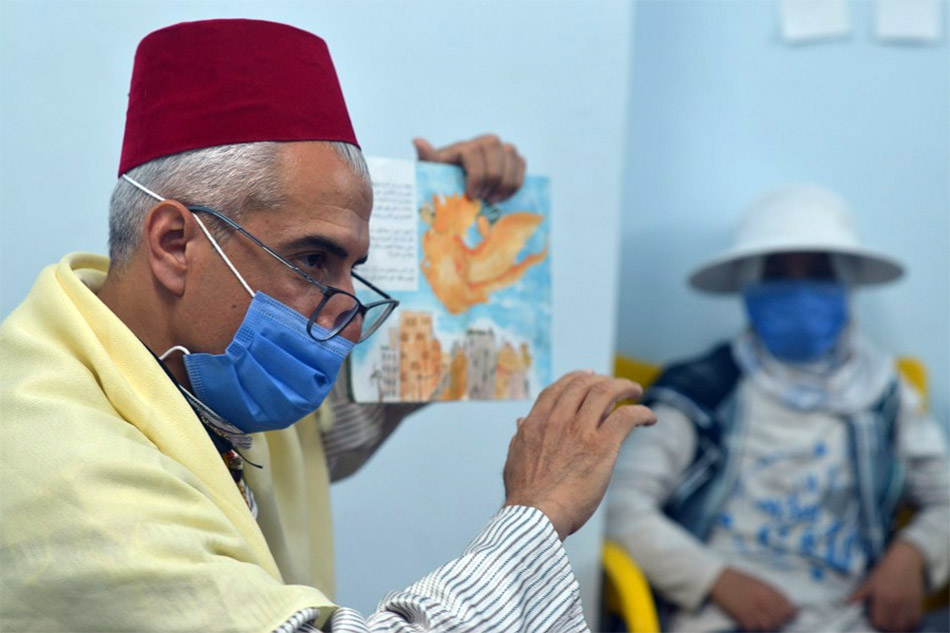
8 July 2021, Damascus – One in 10 people in Syria live with a mild to moderate mental health condition. Prolonged exposure to conflict and the COVID-19 pandemic have continued to strain the mental well-being of families. In response, WHO Syria and local nongovernmental organizations in Rural Damascus recently launched the “My Hero Is You” campaign, which aims to reduce anxiety and fear associated with COVID-19 among children, and enhance the ability of parents to effectively talk to children about their well-being.
The pilot campaign reached 5000 children and included messages about how to cope with stress delivered through a colouring book. The book was adapted to the Syria context and is based on a children’s story, entitled “My Hero is You”, developed by WHO and other members of an United Nations inter-agency committee on mental health and psychosocial support in emergency settings. The campaign also included the provision of psychosocial support sessions and focus group discussions, attended by 2000 parents, caregivers and health educators who discussed their concerns, coping mechanisms and support strategies for children experiencing stress in the context of the COVID-19 pandemic.
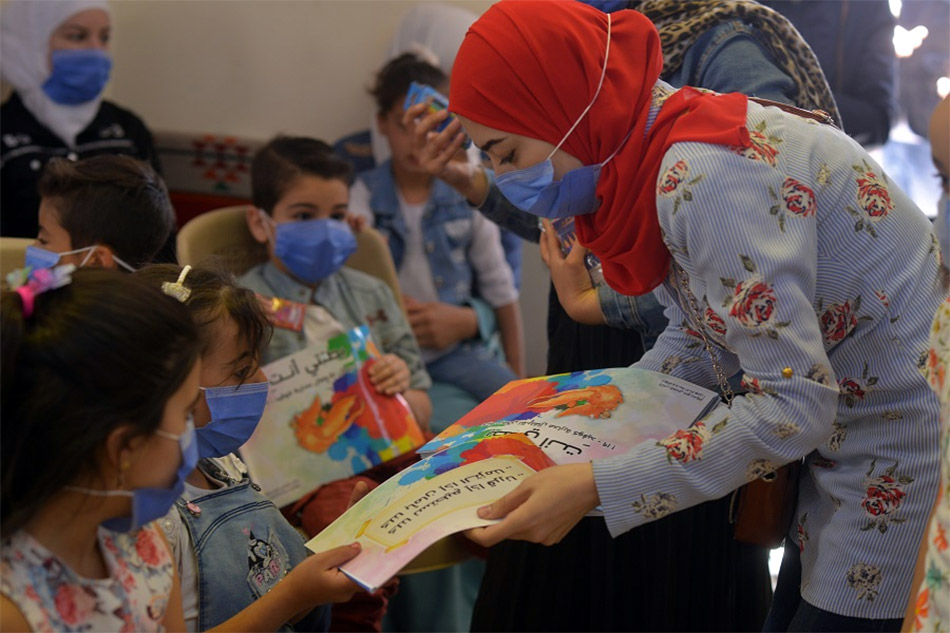
“In recent years, there has been increasing acknowledgement of the role of mental health in people’s overall well-being and, especially, children’s development. In Syria, the conflict was exacerbated by the COVID-19 pandemic and its adverse economic impact, so the need to address mental health has become even more acute. Thus, our increased focus on mental health aims at listening to communities – to their fears, concerns and experiences of coping with COVID-19 - and empowering them with tools and skills to stay mentally resilient and adapt to a new normal,” said Dr Akjemal Magtymova, WHO Representative in Syria.
The campaign, funded by the Solidarity Response Fund, was made possible thanks to partnerships with Al-Tal and Al-Qutayfah nongovernmental organizations, members of which received training by WHO prior to the campaign launch. The training was based on the WHO global package and adapted to the Syrian context to tailor it to the current needs of community workers who provide basic psychosocial support services to parents and children.
“I am proud to be part of the initiative through which I could teach parents and children how to overcome anxieties and stay positive despite the circumstances surrounding them. It was a joy to observe children reading and colouring the story and imagining themselves travelling around Syria with characters, like Ario, to share with other children what they have learned from the book and what to do to prevent transmission of COVID-19,” said Ahmed Sousan, 30, a volunteer from Rural Damacus who received WHO training.
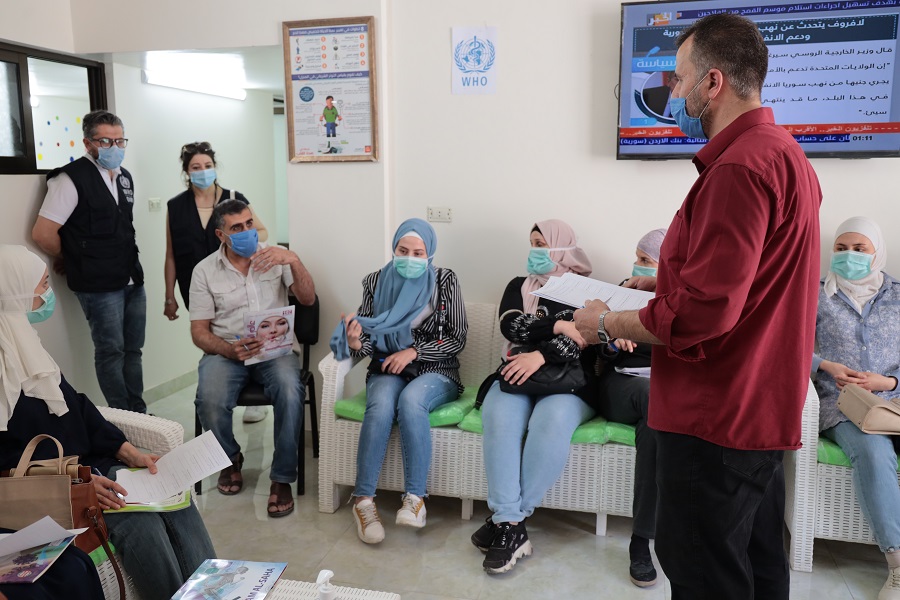
“Maintaining a healthy lifestyle and work life balance were among the recommendations I received during the psychosocial support sessions, in addition to tips on how to talk to children about COVID-19 related fears. It was important for me to share how the pandemic affected the mental well-being of my family. I felt others shared the same concerns and together we can overcome the challenges of the current times,” said one of the parents at the Al-Tal centre.
Following the success of the pilot programme in Rural Damascus, WHO plans to replicate the initiative in Homs, Aleppo and other governorates this year to reach thousands of parents and children in need of mental health support; and in collaboration with the Regional Office for Eastern Mediterranean will also share the initiative’s best practices for other countries in the Region to replicate.
Media contact
Gulalek Soltanova
External Relations/Communications Officer
WHO Syria Office
Damascus, Syrian Arab Republic
+963 953 888 477


